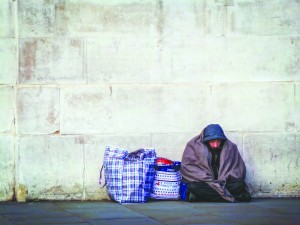
Spring means different things to different Rhode Islanders. For some, it means flowers, food trucks and the reopening of Del’s and our public beaches. For anyone down and out, it means they survived another winter. Homelessness remains a visible problem and a public policy failure. For the third year in a row, Senator Josh Miller (District 28, Cranston/PVD), chairman of the Senate Health and Human Services Committee, passed a bill called the Rhode Island Pathways Project in an effort to curb homelessness. It passed last month in the Senate, and awaits a scheduled hearing date as of this writing. It was held for further study the past two years and could face its annual death in the House.
The Rhode Island Pathways Project would direct the Executive Office of Health and Human Services (EOHHS) to allow Medicaid waiver funds to be used to fund housing services. “The acute correlation between homelessness and adverse health conditions is a heinous reality. Unfortunately, issues tend to be aggravated since the tragedy of homelessness brings more attention and concern to shelter than to the treatment options in place,” said Miller in a press release. As quoted from the bill, services would include behavioral health services (including mental health and substance abuse), case management, personal care/assistance, home and community-based services, and housing support services. EOHSS is supposed to obtain Medicaid waivers from the federal government to ensure the homeless get these services.
The bill was inspired by previous legislation by Miller. In 2013 he co-chaired a Senate commission to investigate ways to divert behavioral health visits away from emergency rooms to keep costs down for everyone. Homeless folks are one example of ER super-users — people who overly use ER services. The homeless have nowhere to go for health issues and as a result, they fill up ERs. Instable housing means they can’t practice preventative care, another cost to healthcare. Since the homeless have no way to pay for ER services, hospitals have to increase the price for everyone who can. By giving the homeless six consecutive months of stable housing, you can cut healthcare costs in half because an overnight stay in a RI hospital will almost always exceed the cost of a month of rent.
Miller borrowed the bill’s language from similar legislation that passed in Hawaii. In spring 2013, the homeless rate in Hawaii was 45.1 per 100,000, 1.3 times higher than the national average. Its chronically homeless population reached 1,031 — the first time in the state’s history it exceeded 1,000 people. Of that population, 429 of them reported being diagnosed with a serious mental illness, 299 were substance abusers and 22 had HIV/AIDs. As a result, Hawaii started a program called the Hawaii Pathways Project. Its goal was to achieve sustainable housing stability and address the gaps in supporting housing services. As a result, healthcare costs per client per month dropped by 76%. The housing retention was 90%; 7% returned to homelessness and 3% went to parts unknown. Post-program interviews showed clients self-reporting better health, more abstinence from drugs/alcohol and decreases in psychological/emotional problems.
The bill was introduced in Hawaii by Senator (and doctor) Josh Green, who worked with Miller to bring a similar program to RI. “Getting people into housing removes the burden of finding shelter and allows for the freedom to get connected with programs and employment opportunities, while directly engaging in the most effective preventative care mechanism we have: a roof,” Miller said.
Warwick House Rep David Bennett (District 20) introduced it into the House in February, with essentially identical language. An important thing from these bills and the other ones from the past few years isn’t necessarily the bills themselves, but that these bills, as written, allow for a study on the impact of using Medicaid funds to cover the homeless, something the House won’t even consider.